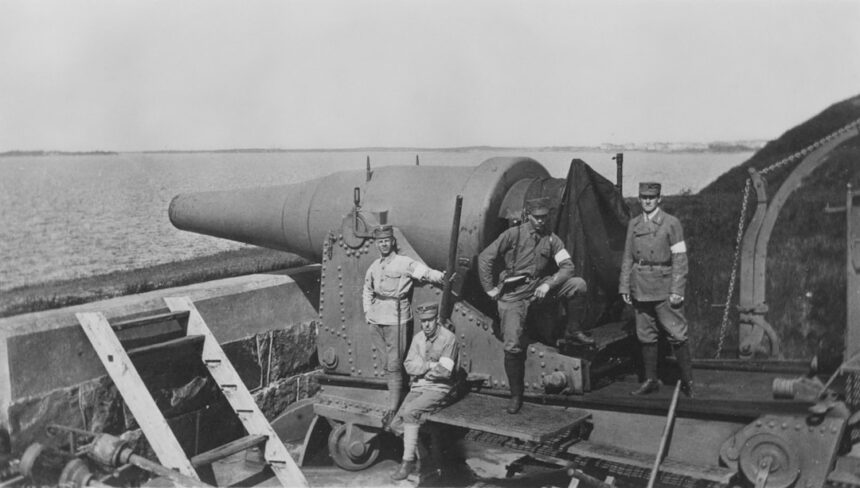The origins of military contracting in the United States can be traced back to the early years of the nation, particularly during the Revolutionary War. As the fledgling country sought to establish its independence, it became evident that a standing army was necessary for defense and military operations. However, the Continental Congress lacked the resources to maintain a full-time military force.
This led to the reliance on private individuals and companies to supply goods and services, ranging from arms and ammunition to food and transportation. These early contracts laid the groundwork for what would evolve into a complex system of military contracting.
The War of 1812 further highlighted the importance of private sector involvement in military logistics and support. Contractors provided essential supplies and services, often at a fraction of the cost that a government-run operation would incur. This reliance on private entities not only facilitated military operations but also fostered a burgeoning defense industry that would continue to grow in subsequent conflicts.
The early years of military contracting set a precedent for future engagements, establishing a relationship between the government and private contractors that would become increasingly intricate over time.
Key Takeaways
- The early years of military contracting in the US saw the government outsourcing various services to private companies, including the production of weapons and supplies.
- Military contractors played a crucial role in World War I, providing the military with equipment, weapons, and logistical support to aid in the war effort.
- World War II had a significant impact on military contracting, leading to an increase in the production of weapons, aircraft, and other supplies by private companies to support the war.
- The Cold War saw a rise in defense contractors as the US government invested heavily in military technology and defense systems to counter the threat of communism.
- Military contractors had a significant influence in the Vietnam War, providing support services, logistics, and supplies to the US military.
The Role of Military Contractors in World War I
World War I marked a significant turning point in the landscape of military contracting in the United States. As the nation mobilized for war, the demand for supplies and equipment surged to unprecedented levels. The government turned to private contractors to meet these needs, leading to a dramatic expansion of the defense industry.
Companies that had previously focused on civilian goods quickly pivoted to produce military equipment, ranging from firearms to aircraft. This shift not only bolstered the war effort but also stimulated economic growth, creating jobs and fostering innovation. The establishment of the War Industries Board in 1917 further formalized the relationship between the government and military contractors.
This board was tasked with coordinating production efforts and ensuring that military needs were met efficiently. The board’s influence led to increased standardization and quality control in military supplies, which ultimately improved the effectiveness of U.S. forces on the battlefield.
The collaboration between government and contractors during World War I laid the foundation for future partnerships, demonstrating the critical role that private industry could play in national defense.
The Impact of World War II on Military Contracting

World War II brought about an unprecedented scale of military contracting, as the United States mobilized its entire economy for war. The sheer magnitude of the conflict necessitated a vast network of contractors to supply everything from weapons and vehicles to food and medical supplies. The government established numerous agencies, such as the War Production Board, to oversee production and ensure that military needs were prioritized.
This era saw the emergence of some of the largest defense contractors in history, many of which continue to play significant roles in military contracting today. The impact of World War II on military contracting extended beyond mere supply chains; it also transformed the nature of warfare itself. The introduction of advanced technologies, such as radar and jet engines, required collaboration between government agencies and private firms specializing in research and development.
This partnership not only accelerated technological advancements but also created a culture of innovation within the defense sector. As a result, military contracting became an integral part of national security strategy, with long-lasting implications for both the economy and military operations.
The Rise of Defense Contractors during the Cold War
| Year | Number of Defense Contractors | Total Defense Spending (in billions) |
|---|---|---|
| 1950 | 500 | 10 |
| 1960 | 1000 | 30 |
| 1970 | 1500 | 50 |
| 1980 | 2000 | 80 |
The Cold War era marked a significant evolution in military contracting, as geopolitical tensions between the United States and the Soviet Union drove an arms race that necessitated increased defense spending. During this period, defense contractors flourished, with many companies expanding their operations to meet the growing demands of national security. The government invested heavily in research and development, leading to breakthroughs in missile technology, nuclear weapons, and advanced aircraft systems.
This investment created a symbiotic relationship between government agencies and private contractors, with each relying on the other for success. As defense budgets swelled, so too did concerns about accountability and oversight. The sheer scale of military contracting during the Cold War raised questions about efficiency and effectiveness, prompting calls for greater scrutiny of defense spending.
Despite these concerns, the relationship between government and contractors continued to deepen, with many firms becoming heavily reliant on government contracts for their survival. This period solidified the role of defense contractors as key players in shaping U.S. military policy and strategy, setting a precedent for future conflicts.
The Influence of Military Contractors in the Vietnam War
The Vietnam War further underscored the growing influence of military contractors in U.S. military operations. As American involvement escalated, so did the reliance on private firms to provide logistical support, equipment maintenance, and even combat services.
Contractors played a crucial role in supplying troops with essential resources, often operating in dangerous environments alongside military personnel. This shift marked a significant departure from previous conflicts, where contractors primarily focused on supply chains rather than direct support on the battlefield. The Vietnam War also highlighted some of the challenges associated with military contracting.
Issues such as cost overruns, inefficiencies, and questions about accountability became increasingly prominent as contractors took on larger roles in military operations. The complexities of managing contracts in a war zone led to scrutiny from both Congress and the public, raising concerns about transparency and ethical practices within the defense industry. Despite these challenges, military contractors continued to play an essential role in supporting U.S.
forces, further entrenching their position within the military-industrial complex.
The Evolution of Military Contracting in the Post-Cold War Era

Following the end of the Cold War, military contracting underwent significant changes as geopolitical dynamics shifted. With reduced defense budgets and a focus on peacekeeping missions rather than large-scale conflicts, many defense contractors faced uncertainty about their future prospects. However, this period also saw an expansion into new markets, as companies sought opportunities in areas such as information technology and cybersecurity.
The rise of globalization further complicated the landscape, with contractors increasingly operating on an international scale. The post-Cold War era also brought about increased scrutiny of military contracting practices. As public awareness grew regarding issues such as wasteful spending and lack of accountability, calls for reform intensified.
In response, both government agencies and contractors began implementing measures aimed at improving transparency and efficiency within the procurement process. This evolution reflected a broader recognition of the need for responsible stewardship of taxpayer dollars while still ensuring that national security needs were met effectively.
The Role of Military Contractors in the War on Terror
The events of September 11, 2001, marked a new chapter in U.S. military history and significantly impacted military contracting practices. In response to the War on Terror, which included conflicts in Afghanistan and Iraq, there was an urgent need for rapid mobilization and support for U.S.
forces deployed overseas. Military contractors played an essential role in this effort by providing logistical support, intelligence services, and even direct combat assistance in some cases. Their involvement allowed for greater flexibility and responsiveness in addressing emerging threats.
The reliance on contractors during this period raised important questions about accountability and oversight once again. As private firms took on increasingly critical roles in combat zones, concerns about their actions and decision-making processes came to the forefront. High-profile incidents involving contractor misconduct prompted public outcry and led to calls for greater regulation within the industry.
Despite these challenges, military contractors remained integral to U.S.
The Controversies Surrounding Military Contracting in Iraq and Afghanistan
The wars in Iraq and Afghanistan brought numerous controversies surrounding military contracting into sharp focus. High-profile incidents involving contractor misconduct raised ethical questions about their role in combat operations. Reports of abuse by private security firms and allegations of overcharging for services fueled public outrage and led to increased scrutiny from lawmakers.
These controversies highlighted not only issues related to accountability but also concerns about how privatization had transformed aspects of warfare. In response to these challenges, both Congress and various oversight bodies sought to implement reforms aimed at improving accountability within military contracting practices. New regulations were introduced to enhance transparency and ensure that contractors operated within established ethical guidelines.
However, critics argued that these measures often fell short of addressing systemic issues within the industry. The controversies surrounding military contracting during this period underscored the complexities inherent in balancing national security needs with ethical considerations.
The Shift towards Privatization in Military Contracting
In recent years, there has been a notable shift towards privatization within military contracting practices. This trend reflects broader societal changes regarding government involvement in various sectors, including defense. Advocates argue that privatization can lead to increased efficiency and innovation by leveraging private sector expertise while reducing costs associated with government-run operations.
However, critics contend that this shift raises significant concerns about accountability and oversight. As privatization continues to shape military contracting practices, it is essential for policymakers to carefully consider its implications for national security. Striking a balance between leveraging private sector capabilities while ensuring responsible stewardship of taxpayer dollars remains a critical challenge facing both government agencies and contractors alike.
The ongoing evolution of military contracting will likely continue to reflect broader societal debates about the role of privatization in public service delivery.
The Future of Military Contracting in the US
Looking ahead, the future of military contracting in the United States is poised for further transformation as technological advancements reshape warfare dynamics. Emerging technologies such as artificial intelligence, autonomous systems, and cyber capabilities are likely to drive demand for specialized contractors who can provide innovative solutions to complex challenges facing national security. As these technologies evolve, so too will the nature of contracts awarded by government agencies.
Moreover, as geopolitical tensions persist globally, there will likely be an ongoing need for robust partnerships between government entities and private contractors to address emerging threats effectively. However, navigating this landscape will require careful consideration of ethical implications associated with privatization while ensuring accountability remains at the forefront of decision-making processes within defense procurement practices.
The Ethical and Legal Challenges of Military Contracting
The ethical and legal challenges surrounding military contracting are multifaceted and complex. As private firms take on increasingly critical roles within national defense operations, questions arise regarding their accountability for actions taken during conflicts or peacekeeping missions. Issues such as contractor misconduct or lack of oversight can lead to significant legal ramifications not only for individual companies but also for government agencies involved in procurement processes.
Furthermore, ethical considerations surrounding profit motives versus national security interests complicate discussions about military contracting practices moving forward. Striking a balance between leveraging private sector capabilities while ensuring responsible stewardship over taxpayer dollars remains paramount as policymakers navigate these challenges ahead. In conclusion, military contracting has evolved significantly throughout U.S history—from its early beginnings during revolutionary times through major conflicts like World Wars I & II up until contemporary engagements such as those seen during Iraq/Afghanistan wars today—highlighting both opportunities presented by collaboration between public/private sectors alongside challenges posed by ethical/legal implications inherent within this complex landscape moving forward into future endeavors related national security efforts overall.
The history of U.S. military contracting is a complex and evolving narrative that has significantly shaped the nation’s defense capabilities and economic landscape. From the early days of the republic, when privateers were commissioned to protect American interests, to the modern era of sophisticated defense contractors, the relationship between the military and private industry has been pivotal. A related article that delves into the intricacies of this relationship can be found on In The War Room’s website. For a deeper understanding of how military contracting has evolved over the years, you can read more about it here. This article provides valuable insights into the challenges and controversies that have accompanied military contracting throughout U.S. history.
WATCH THIS! From Tehran to Blackwater: The Real Story
FAQs
What is the history of US military contracting?
The history of US military contracting dates back to the Revolutionary War, when the Continental Army relied on private contractors for supplies and services.
When did the modern era of military contracting begin?
The modern era of military contracting began during World War II, when the US government relied heavily on private industry to produce weapons, equipment, and supplies for the war effort.
How has military contracting evolved over time?
Military contracting has evolved from a reliance on small-scale private suppliers to a complex system of large defense contractors that provide a wide range of goods and services to the military.
What are some key milestones in US military contracting history?
Key milestones in US military contracting history include the establishment of the Defense Department’s Defense Contract Management Agency in 1989 and the passage of the Defense Acquisition Reform Act in 1990.
What are some controversies surrounding military contracting?
Controversies surrounding military contracting include cost overruns, fraud and abuse, and conflicts of interest among defense contractors and government officials.
How does military contracting impact the US economy?
Military contracting has a significant impact on the US economy, providing jobs and driving innovation in the defense industry. However, it also raises concerns about government spending and the influence of defense contractors on policy decisions.




